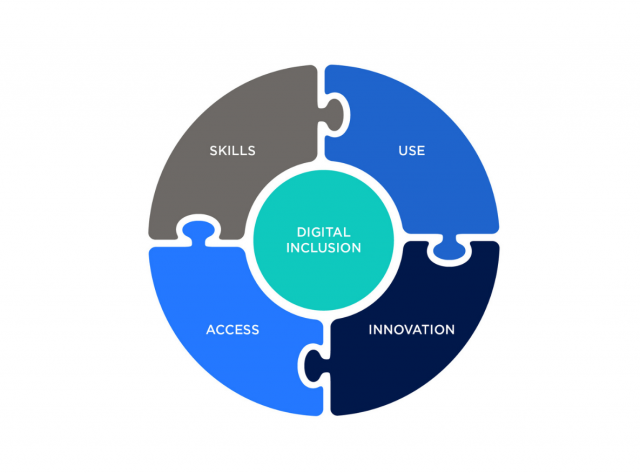50 more tech companies to be ranked in Digital Inclusion Benchmark
In 2020, the world’s 100 most influential technology companies were ranked, by the first-ever Digital Inclusion Benchmark, to assess how their work contributes towards bridging the global digital divide. This year’s benchmark will be ranking 50 more companies, making it a total of 150 digital companies, ranging from hardware manufacturers to telecommunications providers, and IT services and software. By 2022, the benchmark will expand to cover all 200 digital technology companies within the SDG2000, assessing their work on promoting digital inclusion.
Who are the new 50 companies?
The 50 new additions are companies with global reach, such as LG and Sony, alongside companies with a more regional focus, such as Gojek. In particular, one of the new companies, Zoom, has become a well-known name during the ongoing COVID-19 pandemic. All 50 of the most influential digital companies included, whether a national telecommunications provider such as BT Group, or a global hardware manufacturer such as ASUSTeK, have a vital role to play in advancing digital inclusion.
The new 50 companies are also keystone companies in achieving the Sustainable Development Goals (SDGs), meaning their actions are essential in shaping wider systemic transformation. These companies have the capacity to make real change in driving a sustainable future.
The new 50 companies are listed below.
What is the Digital Inclusion Benchmark?
The Digital Inclusion Benchmark assesses company performance towards a more inclusive digital economy and society. The importance of digital inclusion is especially clear in light of the coronavirus global pandemic, with digital connectivity becoming vital to education, work opportunities, and even general wellbeing. COVID-19 has accelerated the use of digital technologies, with much of this change likely to stay.
As daily life increasingly becomes reliant on effective access to digital technology, it is important to ensure this connectivity is occurring ethically and equitably. To this end, the Digital Inclusion Benchmark looks at company efforts across four areas: access, skills, use and innovation. For more information about our approach, please consult the methodology.

The progress so far?
The inaugural Digital Inclusion Benchmark ranked 100 keystone digital companies. The results show that the majority of the 100 most influential tech companies have not yet embraced their responsibility towards digital inclusion with an average performance at just 37%.
Some companies were clear leaders in their contributions to digital inclusion, with Telstra, Telefónica and Orange the top three companies in the benchmark, demonstrating a holistic approach and comprehensive adherence to best practices across the four measurement areas. Telecommunications services on the whole demonstrated stronger performance than their counterparts in the hardware and software and IT services industries. Maturity was also a key characteristic in the top-scoring companies, with the top 10 companies demonstrating an average age of 75 years.
However, many benchmarked companies are not doing enough to bridge the digital divide, with the younger software and IT services companies lagging behind their older peers. Key areas for improvement include child digital safety, where only 16% of companies had made a high-level commitment. A closer look at last year’s results including rankings and scorecards can be found on the results portal. For a deep dive into the benchmark, the results and trends are outlined in the synthesis report.
Digital companies must leave no one behind
Progress in advancing a more inclusive digital society must take a holistic approach to ensure basic social principles are also being met. Accordingly, this year all 150 benchmarked digital companies will also be assessed against core social indicators. These indicators outline the fundamentals that all companies should be meeting to ensure no one is being left behind as the transition to a more sustainable future occurs.
Based on three categories (human rights, decent work and ethical conduct), companies will be assessed on their work to further a more holistic sustainable future, including their commitments to human rights alongside their commitments to pay living wages and fair taxes. The core social indicators are detailed in the social transformation framework.
We look forward to assessing companies’ improvements, especially their contributions throughout the pivotal year of 2020. As a fundamental part of this, we are looking forward to building strong relationships with both the original 100 and new 50 companies involved in the benchmark. Ultimately, together we will build momentum throughout the digital sector, to advance a more inclusive digital future.
For any questions, please contact info.digital@worldbenchmarkingalliance.org or consult the FAQ.